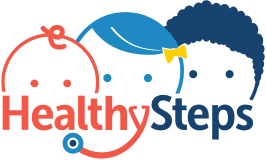Research shows the first three years of a baby’s life are a period of incredible growth and development. A ZERO TO THREE program, HealthySteps, focuses on connecting infants and toddlers – particularly those in low-income communities – with primary care providers. Learn more about its efforts from Crystal Kellybrew, HealthySteps Specialist at Little Rock Pediatric Clinic.

In Arkansas, nearly 90% of infants and toddlers on Medicaid had at least one pediatric checkup in 2019. Why does that make HealthySteps such a powerful model of care?
In the first three years of a child’s life, children are expected to have around 12 checkups. That gives a HealthySteps Specialist at least a dozen opportunities to touch base with the family and identify any needs for assistance through community, developmental, or behavioral resources. By using an interdisciplinary approach that pairs social workers or child development specialists with pediatricians, more needs and concerns are being addressed during a single visit.
How is HealthySteps working to meet children’s needs in Arkansas, and what services does a HealthySteps Specialist help participating physicians’ offices provide?
During our well-child checkups, all families complete screeners to ensure their child’s development is on track and that the family’s needs are met. Because pediatricians and nurse practitioners are limited on time that can be spent with each family, I am able to educate and assist in the realm of special topics such as safe sleep, infant crying, developmental milestones, and mental health to name a few. The doctor and I work closely together, so he or she is aware of what occurred during my visit with the family and my next steps.
Why does HealthySteps make it a priority to connect children and families to resources that go beyond the walls of their pediatric clinic? How can this improve health and well-being?
We find that families are not aware of different resources that can help. Not only are we informing families about available community resources – such as WIC, SNAP, or food pantries to help with food insecurity – but we are also following up to make sure they were able to connect with that resource. The follow-up is important because it shows the family that we really do want to help, and it facilitates accountability. Additionally, improving health and well-being often depends on having access to the right resources. For example, the sooner we can identify a developmental delay, the sooner we can get the family in contact with proper intervention services. Receiving early services gives that child a chance to get individualized support to close gaps and continue to grow.

Can you talk about how practices determine which families receive which services? How do screenings play a role? Within each “tier,” what services and supports do families with higher needs receive?
Each practice works with a different population, so the criteria for services looks different from clinic to clinic. Our clinic prioritizes provider concerns and issues identified on the universal screeners, which are accessible to all of our families with infants and toddlers. If there is a concern marked on a screener, the provider will follow up with the family, then contact the HealthySteps Specialist if it is determined that services could be helpful. Once the specialist meets with the family and discusses concerns, she will determine if the family is Tier 2 or Tier 3. If a family is Tier 2, they have access to HealthySteps resources, access to the support line, and one to three consults with the specialist. HealthySteps resources include handouts on specific topics, such as breastfeeding tips and how to handle a crying newborn. Tier 2 is considered short-term, so the family will be able to graduate from Tier 2 support after the specialist follows them for a few months. With Tier 3 families, we plan to follow the families up to the child’s fourth birthday. They will receive all the services Tier 2 receives, and the specialist will interact with the family at each checkup.
I know you’re early in implementation, but what kinds of needs are families sharing?
The biggest need I am currently seeing is food insecurity. This is a common concern in our community, and with prices of food rising, more families are seeking assistance. Many families are not able to stretch their food budget for an entire month. I have many families who do not qualify for SNAP, so we are having to find other options for them. Another need that I am able to identify with families is behavioral health challenges. I have families who have a history of mental health concerns that may heighten their chances of experiencing postpartum depression or anxiety. During a well-child visit, this gives me an opportunity to screen and touch base about how caregivers are feeling. Along with parental behavioral health, I can educate families about their child’s mental health. People don’t give children enough credit when it comes to their feelings. If a child has experienced something traumatic, they are likely to be affected, and there are dyadic infant mental health services that can help families heal together. I can suggest these services and follow up with families about the child’s progress.
What is your favorite part of being a HealthySteps Specialist? Do you feel like you’re breaking new ground here in Arkansas?
My favorite part about being a HealthySteps Specialist is hearing the impact stories. I have had the opportunity to meet with several families who are grateful for someone to guide them through the process of finding services and making sure their needs are being met, outside of medical care. Being able to make a difference in the lives of others has always been my passion, and with this position, I am able to do just that. It helps having a clinic full of people who want the exact same thing.
All seven HealthySteps demonstration sites, which are at pediatric practices across Arkansas, are projected to be serving families with young children this summer.
To stay updated about our continued efforts to ensure all Arkansas families have access to quality health care, sign up for our newsletter or follow us on Facebook and Twitter.
